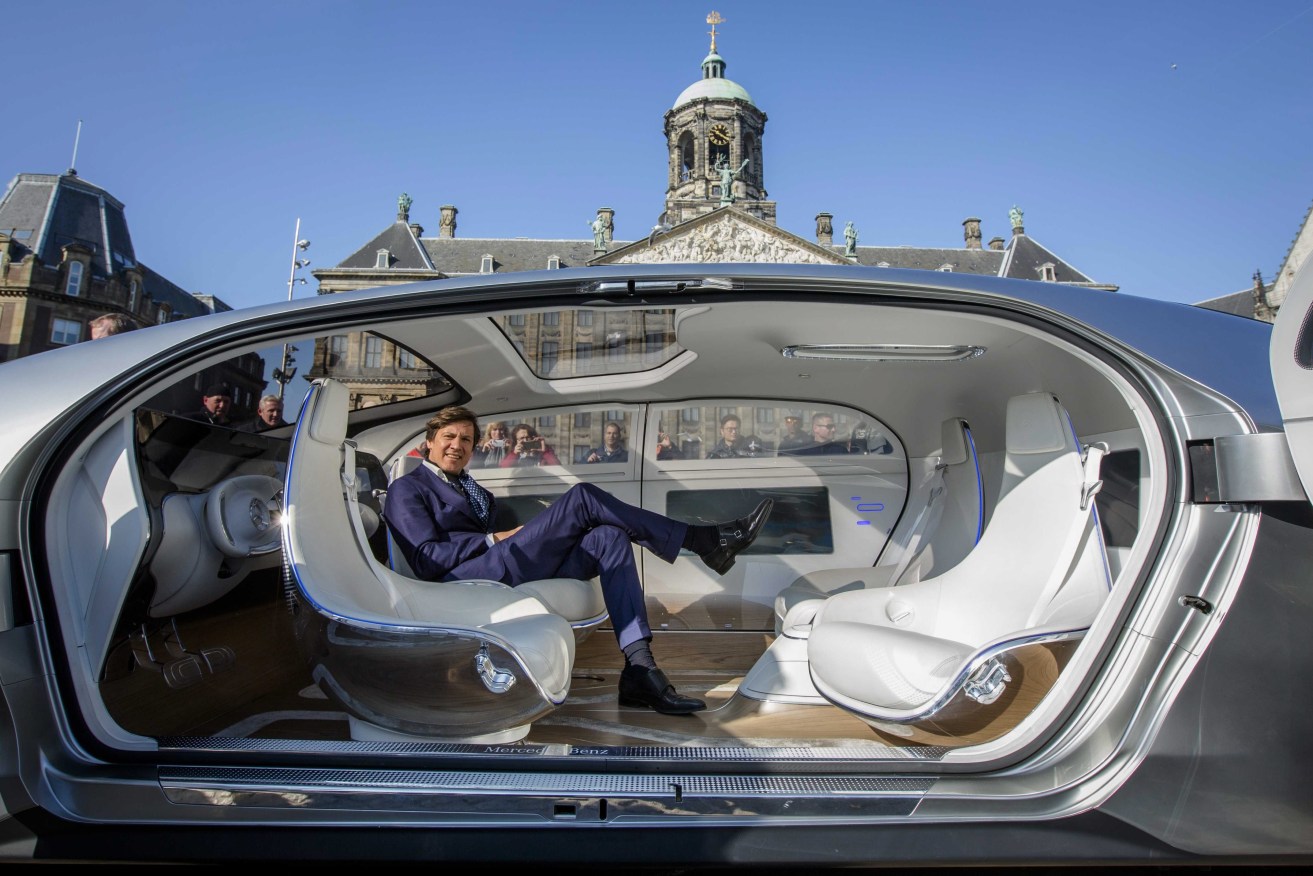From dog walking to dating: the endless possibilities of driverless cars
While global debate is raging about the ethical conundrums of driverless cars, few people are talking about the endless possibilities they offer. Robotics expert Jonathan Roberts outlines some surprising and revolutionary ideas.

The interior of the Mercedes Benz F 015 self-driving car. Photo: EPA/Bart Maat
If you happen to live Pittsburgh in the US or Milton Keynes in the UK, then you may occasionally see one of the driverless, or self-driving, cars that are currently being tested around the world.
With most major car makers developing the technology, plus new entrants into the car world such as Google, Uber and Apple, it is evident that driverless cars will eventually become real and mainstream.
The media is awash with discussion of how driverless cars work, the ethical dilemmas in their use and how will they impact the workforce of professional drivers.
A recent article listed 25 shocking predictions about a future with driverless cars.
But few people are talking about revolutionary and maybe unexpected ways people will use driverless cars once they are autonomous and common place.
Some of these interesting uses will not be for everyone, and many will be highly controversial, but when something as pervasive in our society as the car undergoes a revolution, we can expect a whole lot of other big changes.
Driverless really means no driver
The driverless cars of the future really will have no driver. And more importantly, no potential driver.
At this stage, the various authorities that grant permits to test driverless cars have required they all have a back-up driver who, in theory, can take over in an emergency. This is for good reason: driverless cars have not yet been demonstrated to be reliable or safe enough.
But the idea of a reliable human back-up driver is problematic. Research shows that the ability for someone to process the immediate situation, take control of a vehicle and avoid an impending accident is limited at best.
So we should assume future driverless cars will not require a human back-up driver, once authorities are shown that having such a person is less safe than having no-one at the wheel.
With the assumption of truly autonomous cars, what will people want to do with them?
Delivery (of everything and everyone)
A first use for a truly driverless cars will revolve around the delivery of goods, people and animals. If you know that there will be another person at the destination to unload the car, then the options are almost limitless and potentially scary.
Imagine an off-leash dog park with a human attendant to handle the dogs. The lazy or busy future dog owner could load their dog into a driverless car at home and send it off to the dog park. No more the dog owner walking the dog.
What about incapacitated people? Had a few too many drinks while you are out on the town? Hop into a truly driverless car and be taken home.
Sick of being a taxi-driver parent, and don’t like the idea of popping your little ones into a ride sharing car? If a driverless car can transport dogs and drunks then transporting children will be easy.
But should children be allowed to be transported unaccompanied by an adult or a responsible person? How would restrictions on the transport of children in driverless cars be policed?
If the car can not be interfered with by its occupants, then the question only revolves around the care of children and not the safety of road users.
Have a morning meeting in a town eight hours drive away? Why not book a sleep-pod driverless car to drive you overnight to your destination. Such cars could be equipped with comfortable beds and even a small airline style toilet.
The privacy of your own pod
Some industry experts have already raised concerns that the introduction of self-driving cars could see a car’s backup driver engaging in dangerous sex. But could it be that the future of paid-for-sex or casual sex will be enabled by autonomous driverless cars?
It does not take much imagination to consider that a business could be created that utilises apps, driverless cars and the desire to make lots of money. Maybe it will be that dating-like apps will exist that get people together in discrete driverless cars.
Driverless cars will not need any windows and will be able to drive around the streets without anyone outside having any idea what might be going on inside.
What will this mean for our relationships? Sex outside traditional relationships will be uber easy, as it were. For some, this is great news. For others it will be confronting.
Will governments try and legislate against it? Will religious groups start campaigns to try to ban it? Will it create a new class of paid sex worker who just does a few jobs a week to earn some extra money? Will the future driverless car companies offer this service on top of their standard transport options?
The sex industry has always been regulated with the use of location as a weapon against it. You can’t have a brothel here, you can’t pick up here, and so on.
But driverless cars are just around the corner and they have the potential to change this business totally. The sex industry has also traditionally been a fast adopter of new internet-based technology and the industry is experiencing great change because of it.
In the end, the advent of truly autonomous driverless cars will change society in ways that are hard to predict. But one thing is for sure, they will have a serious impact on the way most of us live, whether we like it or not.
Jonathan Roberts is Professor in Robotics at the Queensland University of Technology.
This article was originally published on The Conversation. Read the original article.




